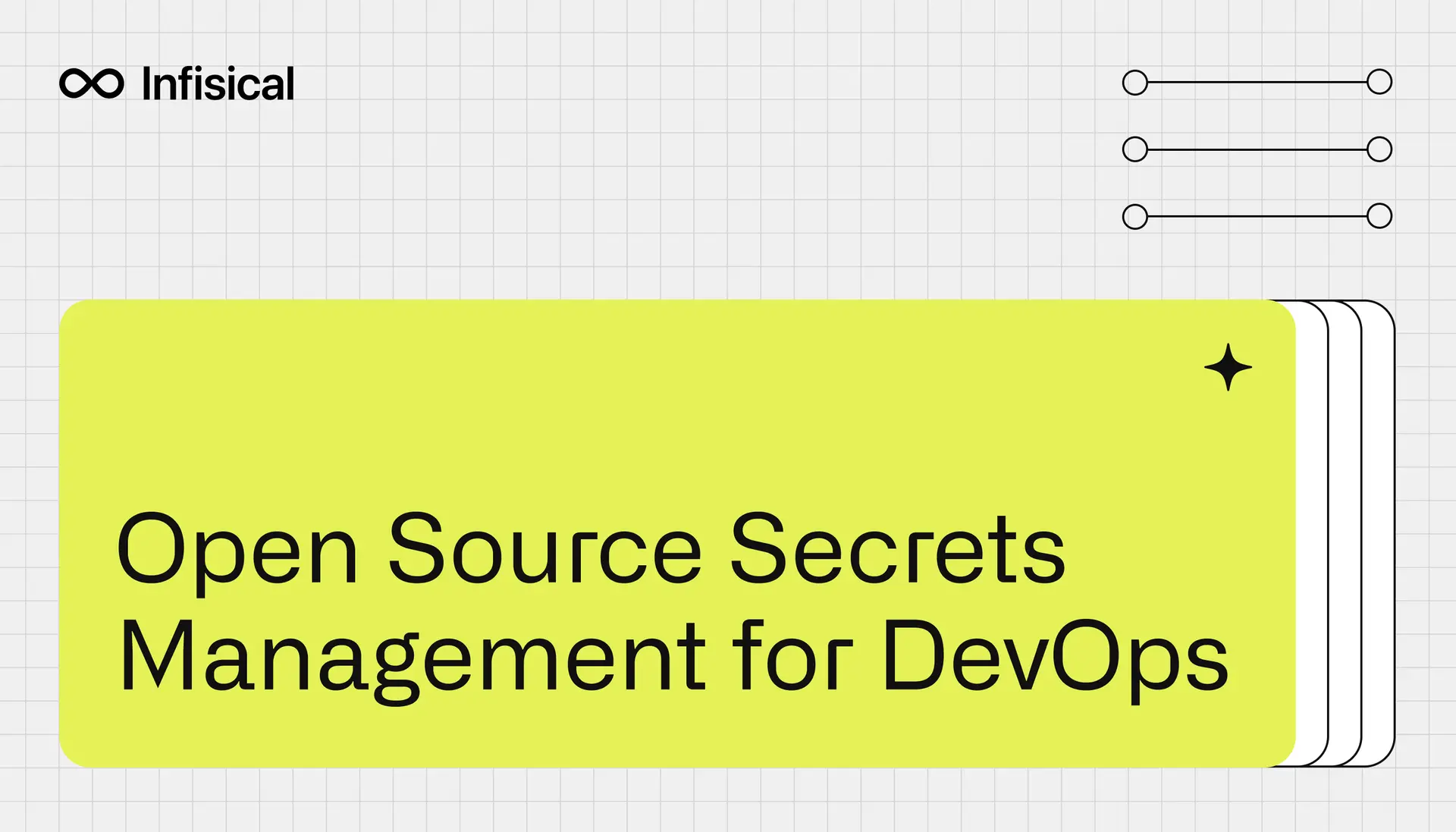
- Introduction
- Why 2026 Feels Different: The Shifting Secrets Management Landscape
- Infisical: Developer-First, Intuitive, and Truly Open Source
- HashiCorp Vault: Full-Stack Security, Complex Trade-Offs
- OpenBao: Vault DNA, Community-Driven Freedom
- External Secrets Operator (ESO): Kubernetes-Native Integration Layer
- Mozilla SOPS: GitOps and File Encryption Focus
- Comparative Analysis: Choosing the Right Tool for 2025
- Key Takeaways and Recommendations
Introduction
Secrets management is now mission-critical for any team running infrastructure at scale. The explosion of microservices, the ubiquity of Kubernetes, and the adoption of infrastructure-as-code and continuous deployment have all multiplied the number of API keys, credentials, tokens, and certificates you need to secure. Mismanaged secrets still cause real-world security incidents—from accidental leaks in public repositories to painful credential rotations after a breach. In 2026, effective secrets management must be seamless for developers, robust for your security posture, and cohesive with your modern toolchain.
This post examines the five leading open-source secrets management tools for DevOps teams: Infisical, HashiCorp Vault, OpenBao, External Secrets Operator (ESO), and Mozilla SOPS. Using the latest research and insights, this guide will help you quickly zero in on the best options for cloud-native engineering and modern workflows.
Why 2026 Feels Different: The Shifting Secrets Management Landscape
DevOps and Platform Engineering have outgrown the era where secrets management was a bolt-on afterthought. Today, DevSecOps and "shift left" principles demand that secrets controls are baked into every step of the development lifecycle. That shift means tools must work natively with your IDEs, CI/CD systems, and GitOps workflows.
Kubernetes dominance has posed new challenges, as the default Secret objects are just base64 in etcd unless you enable encryption at rest and tighten RBAC. That's made tools like Infisical's Kubernetes Operator or ESO absolutely essential for getting secrets into pods securely, without code changes or risky credential handling.
Version control as the source of truth for everything—including secrets—is driving the adoption of file-level encryption tools like SOPS, letting you keep sensitive config alongside code, with decryption only at deploy time.
Multi-cloud and hybrid strategies have pushed teams toward secrets platforms that are cloud-agnostic or can bridge between cloud KMS solutions—enter Vault, Infisical, and OpenBao.
And then, of course, the licensing puzzle: HashiCorp's move to a Business Source License (BSL) for Vault stirred the pot, leading to open-source forks (OpenBao) and increased attention on projects with unambiguously open, permissive licenses like Infisical.
Infisical: Developer-First, Intuitive, and Truly Open Source
Infisical redefines secrets management by prioritizing simplicity and developer experience. Built explicitly for developers, Infisical delivers an intuitive UI and CLI, enabling effortless secret management—including storage, injection, rotation, and scanning—without demanding deep platform engineering expertise. Its fully open-source core under the permissive MIT license.
Infisical offers built-in secret referencing, versioning, secret scanning, and robust environment separation, ensuring best practices from day one.
Critically, self-hosting Infisical leverages a simple, widely-adopted tech stack: PostgreSQL for persistent storage and Redis for caching. This makes it straightforward to deploy, scale, and maintain using Docker or Kubernetes, significantly reducing operational overhead.
Integrations are first-class: native support for Kubernetes (via its Operator or ESO), CI/CD platforms, cloud providers, and popular IaC tools means secrets reach your workloads without friction.
The Infisical docs and active community keep ramp-up low, while advanced features (rotation, dynamic secrets, PKI, advanced RBAC, HA) are available in paid tiers for those who need them. If you value modern DevX and genuine open-source licensing, Infisical is a top contender.
HashiCorp Vault: Full-Stack Security, Complex Trade-Offs
Vault has long been the reference point for centralized, feature-rich secrets management. It supports encrypted storage, dynamic secret generation (for things like database credentials or just-in-time cloud roles), PKI, and even encryption as a service (EaaS) through its Transit engine. The platform's path-based policies, pluggable authentication (from Kubernetes service accounts to LDAP to cloud IAM), and robust audit logging have made it a favorite for compliance-heavy and infrastructure-complex environments.
However, self-hosting Vault introduces significant operational complexity. Teams must choose between using Vault's Integrated Storage (Raft consensus algorithm) or Consul for high-availability and replication—both of which significantly increase the ops burden. While Raft is recommended due to its integrated approach, eliminating external dependencies, it still involves complex cluster management and maintenance overhead.
Vault's move to the restrictive BSL licensing further complicates matters for teams seeking clear, permissive open-source terms. This licensing shift has already prompted many teams to evaluate fully open alternatives.
In short, deploying and scaling Vault is undeniably more challenging, especially in self-hosted, high-availability environments. The operational complexity combined with costly licensing and maintenance effort represents a considerable trade-off for its extensive customizability. If your team prioritizes simplicity, straightforward operations, and truly open-source software, exploring recent alternatives like Infisical may be a wise move.
OpenBao: Vault DNA, Community-Driven Freedom
OpenBao is the community's answer to Vault's license retrenchment: a Linux Foundation-hosted fork of Vault's last MPL 2.0-licensed version. Its goal is to keep the Vault experience, security model, and feature set accessible under a truly open license—MPL 2.0, avoiding any non-OSI-approved terms. If you're familiar with Vault, OpenBao will feel immediately familiar, including support for dynamic secrets, PKI, and flexible storage backends.
The big questions as of 2025 remain around pace of innovation, plugin support, and the maturation of its contributor ecosystem, but it's already notable for those who want Vault-like power under a community-led model.
External Secrets Operator (ESO): Kubernetes-Native Integration Layer
ESO solves a very specific but hugely important problem: getting secrets from external stores into Kubernetes-native workflow, using the familiar Kubernetes Secret objects. It isn't a storage backend itself—instead, it syncs secrets from Vault, Infisical, cloud KMS platforms, or a long list of other providers directly into your cluster, as native K8s Secrets, using CRDs like SecretStore and ExternalSecret. This decouples your applications from platform-specific secrets APIs and fits perfectly into GitOps and K8s-as-the-platform strategies.
Proper RBAC configuration, strong network policies, and enabling Kubernetes at-rest encryption are essential for ESO, since actual secrets end up stored in etcd, but ESO's documentation provides excellent guidance on running it securely at scale.
Mozilla SOPS: GitOps and File Encryption Focus
SOPS carves out a clear niche: encrypting config files for secure storage in Git. Instead of being a secrets platform, it's a smart CLI and editor wrapper that manages encryption and decryption for YAML, JSON, ENV, and more by integrating with KMS systems, PGP, Azure KV, or Vault Transit.
If you're committed to a GitOps workflow (using Flux, Argo CD, or Helm plugins), SOPS lets you put encrypted secrets right in repo, decrypting only at deploy time. It's simple, scriptable, and puts the operational burden on KMS key management rather than running a server. Check the SOPS README and docs for precise details on supported formats, CLI usage, and how to combine with your preferred CI/CD or GitOps workflow.
SOPS is great to start with or for for small teams, but as infrastructure complexity grows, a more dynamic and unified secrets management strategy often becomes necessary. For more details, explore our practical guide to GitOps secrets management.
Comparative Analysis: Choosing the Right Tool for 2025
HashiCorp Vault is still the common for building infrastructure from the ground up, particularly if you're invested in the HashiCorp ecosystem. But the shift to BSL will push anyone needing vendor-neutral, open-source guarantees toward Infisical or OpenBao.
Infisical is winning developer hearts for its "just works" approach, open MIT license for the core, and high-velocity community. Its scanning, UI, and DevX make it a natural fit for modern teams. Stepping up to paid tiers brings enterprise scaling, advanced RBAC, or cross-region replication.
OpenBao preserves Vault's model under a proper open license, at the cost of a younger ecosystem and some uncertainty about long-term divergence versus Vault's BSL path. For true OSS shops that loved Vault, this is a fork to watch closely.
ESO is a must if your workloads run in Kubernetes and your organization uses any external secrets manager. Its operator model is now a best practice, and it underpins scalable multi-cloud K8s architectures. You still need a secrets store (like Vault, Infisical, or OpenBao) to back it, but ESO makes the integration seamless.
SOPS is the no-brainer for small GitOps teams: if you put secrets into Git (and many do, with encrypted files), you need SOPS and strong external KMS hygiene.
Each tool fills a distinct role; many teams will use more than one. For example, consider Infisical as your central store, ESO to surface secrets in K8s, and SOPS for encrypted configs in Git, as explained in Infisical's Kubernetes guide.
Key Takeaways and Recommendations
- If licensing is a showstopper, favor Infisical (MIT) or OpenBao (MPL) over Vault BSL.
- For K8s-heavy environments, pair your secrets store with ESO for smooth, policy-driven sync into the cluster.
- Enterprise features, at scale: Vault or Infisical Enterprise (comparison here), but watch for lock-in and cost signals.
- Optimize for developer experience and fast adoption with Infisical, especially if your team isn't primarily platform engineering experts.
- Use SOPS for version-controlling encrypted secrets in GitOps workflows, but pair with a KMS or secrets server for key management.
- Carefully consider operational overhead: self-hosted secrets management requires proper redundancy, backup strategies, and security hardening.
The modern DevOps landscape demands secrets management that integrates naturally with your workflow, not as a security afterthought, but as an enabler of both velocity and safety. The tools covered here represent the best open-source options as of 2025, each with strengths that might align perfectly with your specific infrastructure and team needs.
And if open source isn't a strong requirement for you, we also recommend reviewing our Top-10 Secrets Management Tools in 2025 for a comprehensive overview of available options.

